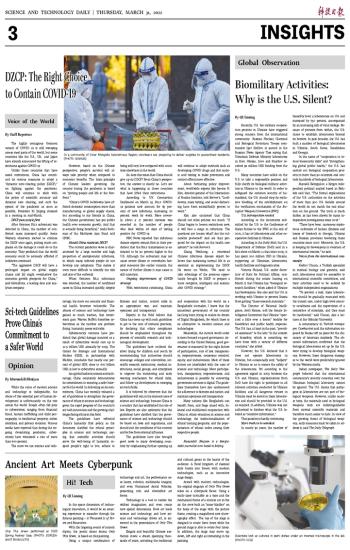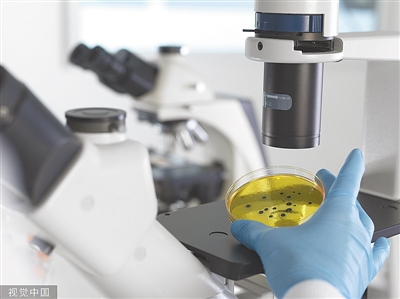
 |
| Scientists look at cultures in petri dishes under an inverted microscope in the lab. (PHOTO: VCG) |
Recently, U.S. bio-military cooperation projects in Ukraine have triggered strong concern from the international community. Russian Nuclear, Chemical and Biological Protection Troops commander Igor Kirillov, is quoted in the Russian News Agency Tass saying that Ukrainian Defense Ministry laboratories in Kiev, Odessa, Lvov and Kharkov received 32 million USD funding from the U.S.
Many countries have called on the U.S. to take a responsible position and fully clarify its biological military activities in Ukraine to the world. In order to safeguard the common security of humankind, the U.S. should stop its exclusive blocking of the establishment on the verification mechanism of the Biological Weapons Convention (BWC).
U.S. introspection needed
According to the documents submitted by the U.S. to the Conference of States Parties to the BWC at the end of 2021, it has 26 laboratories and other cooperative facilities in Ukraine.
According to the Daily Mail, the U.S. Department of Defense (DoD) said in a fact sheet on March 11 that since 2005, it has spent 200 million USD in Ukraine, supporting 46 Ukrainian laboratories, health facilities and diagnostic sites.
Victoria Nuland, U.S. under Secretary of State for Political Affairs, confirmed during the senate hearing on March 8, that Ukraine has "biological research facilities," when asked if Ukraine has bioweapons. She also said the U.S. is working with Ukraine to prevent Russia from getting "those research materials."
The Director of National Intelligence, Avril Haines, told the Senate Intelligence Committee that Ukraine "operated a little over a dozen" biolabs for biodefence and public health response. The U.S. has, at least in the past, "provided assistance" to the labs "in the context of biosafety, which is something we have done with a variety of different countries," she added.
However, the U.S. declared that it does not operate laboratories in Ukraine, but occasionally sent "helpers" to Ukraine so as to ensure the safety of the laboratories. Yet according to the agreement signed in 2005 between the U.S. and Ukraine, representatives from DoD have the right to participate in all relevant activities conducted by Ukraine facilities, and all dangerous viruses in Ukraine must be stored in these laboratories and should be provided to the U.S. as required. In addition, Ukraine was not authorized to disclose what the U.S. labeled as "sensitive information."
This paradox is hardly convincing.
More truth to be unveiled
In nearly 30 years, the number of biosafety level 4 laboratories on U.S. soil increased by 750 percent, accompanied by an increasing risk of virus leakage. Because of protests from within, the U.S. chose to establish laboratories beyond its borders. In past decades, the U.S. has built a number of biological laboratories in Ukraine, South Korea, Kazakhstan and Georgia.
In the name of "cooperation to reduce biosecurity risks" and "strengthening global public health," the U.S. has carried out biological cooperation projects in more than 30 countries and controls hundreds of biological laboratories.
Sheradil Baktygulov, a Kyrgyz independent political analyst based in Bishkek said that, "The formal explanations of the U.S. authorities on the activities of more than 300 U.S. biolabs around the world do not match the real situation on the ground. The truth is much darker, as has been shown by many independent investigations since 2018."
"There have been numerous mysterious outbreaks of human illnesses and losses of livestock in Georgia, Ukraine and Russian provinces bordering these countries since 2007. Moreover, the U.S. is keeping its bioweapons in violation of international treaties," he said.
Voices from the international community
Korkut Ulucan, a Turkish specialist in medical biology and genetics, said such laboratories must be accessible to international scientific committees, and their activities need to be audited by multiple independent organizations.
"To prevent a leak, these laboratories should be gradually evacuated with the utmost care, under high-level security conditions and the supervision of a committee of scientists, and they must be inactivated," said Ulucan, also a lecturer at the Uskudar University.
A commentary in Turkish newspaper, Cumhuriyet said the information exposed by Russia left no place for the chicanery of American misdeeds. The obtained information confirmed that the biological laboratories set up by the U.S. were trying to develop biological weapons. However, these dangerous messages to the world were predictably ignored by the Western media.
Indian newspaper, The Daily Telegraph believed that the international community's security concerns over the Ukrainian biological laboratory cannot be ignored. The U.S. claims that pathogens in laboratories are not part of biological weapons. However, unlike nuclear tests, the materials used in biological weapons tests are indistinguishable from normal scientific materials and therefore much easier to hide. In view of the growing threat of biological weapons, early measures must be taken to address it, said The Daily Telegraph.


 Next
Next




